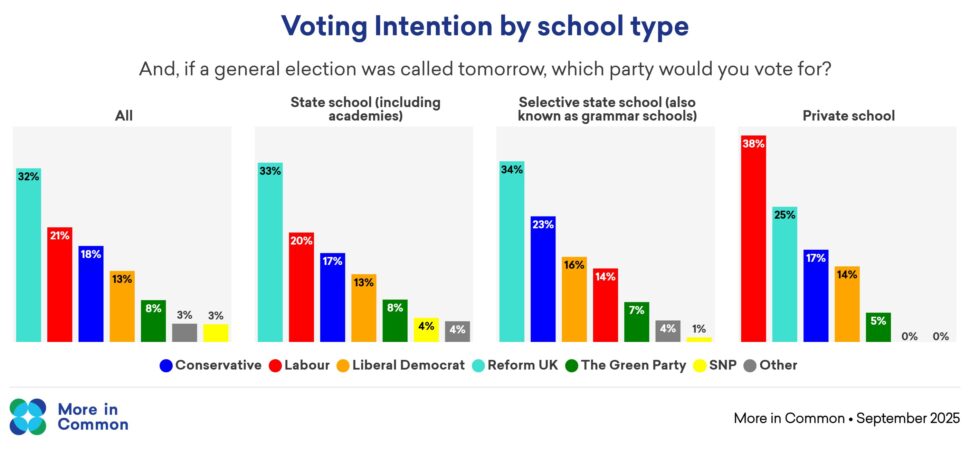In polling, every day really is a school day.
This week, we asked two thousand Britons what type of secondary school they went to, and compared it to their voting intention. Education and politics have always been linked, but the pattern we found is not what you’d expect.
The poll found that Reform UK would win comfortably among those who went to state schools, with 33 per cent of the vote. The Conservatives performed best among former grammar school pupils, winning 23 per cent compared to 18 per cent with the wider public.
What was most striking is that Labour actually has a large lead among former private school pupils, and that’s consistent across other recent polls.
At one level, Reform’s 13-point lead among state-educated voters is easy to explain. It reflects the breadth of the party’s support and the way its voters increasingly resemble the median Briton, while the two main parties look more unusual.
Reform leads among Britons whose favourite cheese is cheddar, and whose go-to takeaway is fish and chips or Chinese food, and its support is spread more evenly across age groups than either Labour or the Conservatives. With Reform looking increasingly mainstream – and with around 93 per cent of Britons attending state schools – it’s hardly surprising that the party leads in this group.
Labour’s lead is harder to explain. For decades, the common assumption was that if you went to a private school, you would probably be a Tory, and if you went to a big comprehensive, then you’re more likely to vote Labour. This polling shows just how dramatically our politics has realigned around class and education over the past decade or so.

But voting intention isn’t just shaped by your demographics; it also shows something deeper about your values and the change you want to see in the country.
In our recent report, Shattered Britain, we map the new faultlines dividing the public: whether you have faith in institutions or want to ‘burn them down’; whether you prefer sweeping change or incremental progress; and whether you’re willing to roll the dice on new radical solutions. We find that these new fault lines tell us far more about Britons’ politics than demographics alone.
Across these divides, we identify seven segments of the British public, each with varying ideas about how much change the country needs, and how best to achieve it.
Between 2019 and 2024 Labour expanded support in six of them, helping to secure a landslide victory. But since the election, Labour’s vote share has fallen across every segment but one: the Established Liberals.
Established Liberals are not Labour’s progressive base. In fact, they are better described as Cameron-era Conservatives: optimistic, comfortable, and broadly content with the status quo. While Labour has lost disaffected voters to the Greens (and potentially Corbyn’s new party) on the left, and to Reform on the right, Established Liberals’ support for the party has remained stable.
That’s why this story goes beyond class. Private education is certainly not a perfect proxy for faith in the system, but those who attended private school are far more likely to think the status quo works for them.
We asked the public whether they think Britain should preserve and improve our institutions, or burn them down and start from scratch. Seven in ten privately educated Britons said we should preserve and improve them, dropping to 58 per cent among those who attended state school.
For those who feel the system is working, Labour now looks like the party of stability and continuity. For those who feel failed by the system, Reform UK offers the chance to ‘roll the dice’ on something new.
Labour’s lead with private school alumni is surprising precisely because it shows us how dramatically our politics is changing.
It’s yet another reminder of how the left-right frames that we used to use to understand voting behaviour are falling apart. We need new ways to understand voters and the influence of class and education on their choices.












Your thoughts